The Second: An Interview with Derrick Hodge
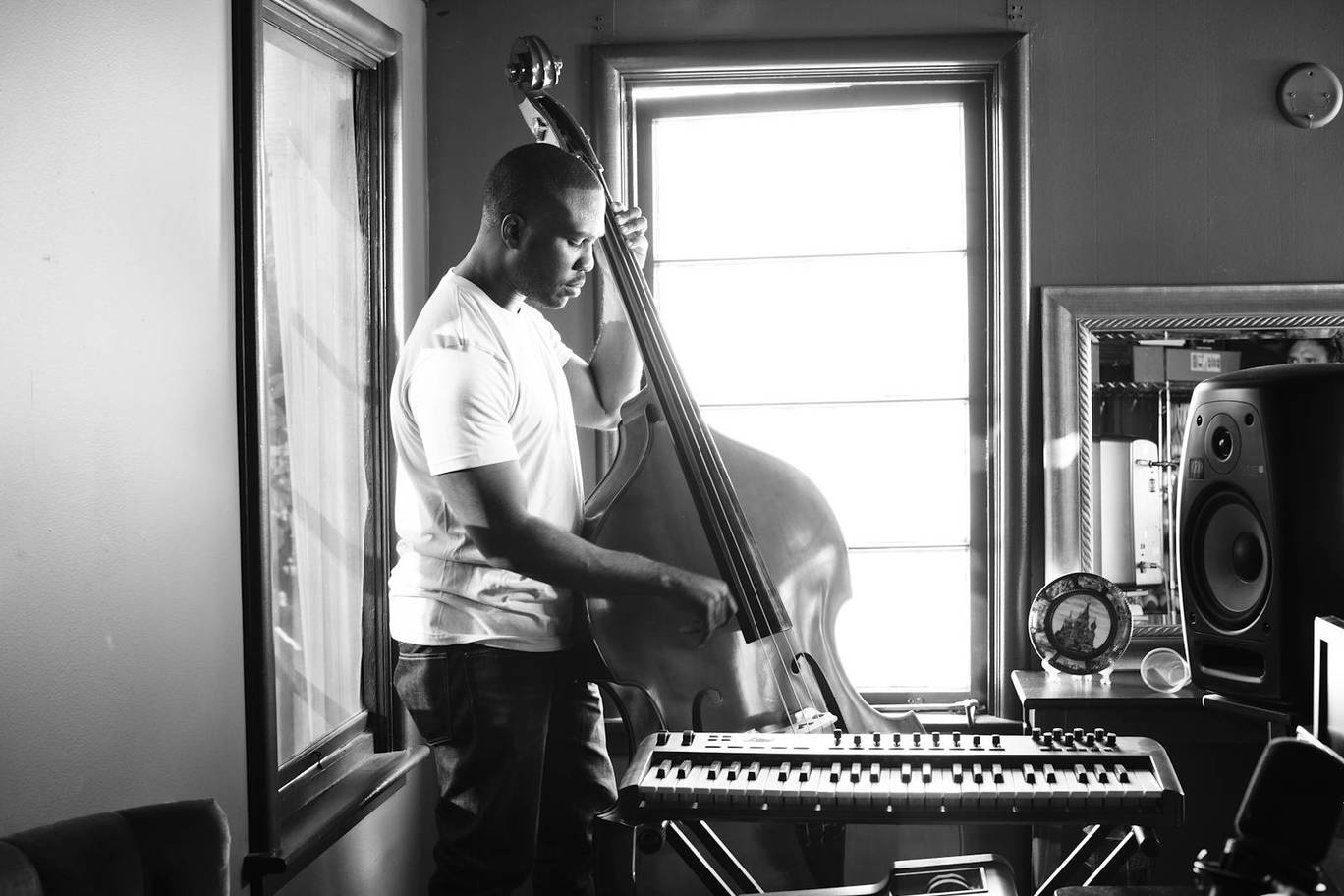
As musicians, our main goal is to express ourselves as freely and truly as possible. One listen to Derrick Hodge’s The Second and you’ll know he achieved that, but it goes deeper. Each song has an openness that seems to touch on the listener’s own emotions, like tapping into a social consciousness.
The Second is, in fact, the bassist’s second solo album, following 2013’s Live Today. When you stay as busy as Hodge, finding time for your own projects isn’t easy. He’s recorded with the top R&B, hip-hop, and jazz talent including Jill Scott, Floetry, Mulgrew Miller, Stefon Harris, Common, Timbaland, Mos Def, Robert Glasper, and more. Most recently he’s been on the road serving as musical director and bandleader for Maxwell.
That’s why a big part of this project was for Hodge to make time to open up and let the music come out. The mostly instrumental album is full of lifting atmospheres, gripping melodies, and strong beats that feel like a soundtrack to life. Incredibly, Hodge performed all of the instruments on the album save for a handful guests. Its final track, “From Me To You”, is the only vocal song (also sung by Hodge) serves as an open thank you note.
We reached out to Hodge to get the scoop on making The Second, how he makes the music intimate, his gear, and what’s coming up next for him.
The Second is such a personal album. Was it meant to be?
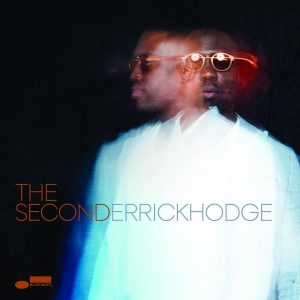 On my first album, they invited me to be part of the Blue Note family. When it came out, people supported it and it just really hit me because it was like, “Wow, they’re really supporting what I have to say creatively as an artist. I want to commit more time to that.” This album was really my way of doing that – just trying to expose myself as much as possible. That was the real motivation: just music for the people. Hopefully if I wrote music that felt a certain way to me that other people would just feel it the same. To help them feel better, love better and take them on a journey, not just walk away from it like, “Oh this guy can play an instrument,” but more like, “This song made me feel a certain way.”
On my first album, they invited me to be part of the Blue Note family. When it came out, people supported it and it just really hit me because it was like, “Wow, they’re really supporting what I have to say creatively as an artist. I want to commit more time to that.” This album was really my way of doing that – just trying to expose myself as much as possible. That was the real motivation: just music for the people. Hopefully if I wrote music that felt a certain way to me that other people would just feel it the same. To help them feel better, love better and take them on a journey, not just walk away from it like, “Oh this guy can play an instrument,” but more like, “This song made me feel a certain way.”
It’s a really cohesive album in that way and each of the songs has this special vibe to it. How do you get that super intimate sound in your bass playing? Do you “go somewhere” or are there certain techniques you use?
More than anything it was just making time in my every day life where I could focus and just create and put myself in a position where I don’t have to think about it. Time where I could just go down to my studio at anytime and just create something that I’m feeling, then build upon it without trying to make it seem a certain way or make it do anything other than what I’m honestly feeling in the moment. The biggest thing for me was how do I create time where I can let the music and let life speak to me and hopefully respect it enough where I can put the amount of time needed to make it happen. [That and] trusting it so when I would record something, I would not go back over it and make it sound like the best version of myself.
Every song has a certain element of rawness and a first-take vibe to it. For the other elements built around it, I kind of went into the songwriter side and the producer side to make the song itself speak. But in terms of trying to make the bass sing a certain way, I try to just put myself in a situation where I didn’t think about that. I wanted people to get something honest. No matter what, I just said, “Let me trust it,” so it means a lot to me by the reaction from people saying they felt that connection. They’re taking that emotion and personalizing it for themselves. That really was the goal, instead of trying to prove a point from the bass or something like that.
It struck me as almost a vocal album without vocals, except for the last track, of course.
When I listen to it now, it’s funny. People used to ask me my influences and I would bring up vocalists a lot, along with the wealth of amazing bass players that I had the fortune of learning from throughout my life. But vocalists have influenced me a lot. I can really feel that emotion speaking on this record. The way the voice sings and the way it touches people in a certain way, I can definitely feel that on this album.
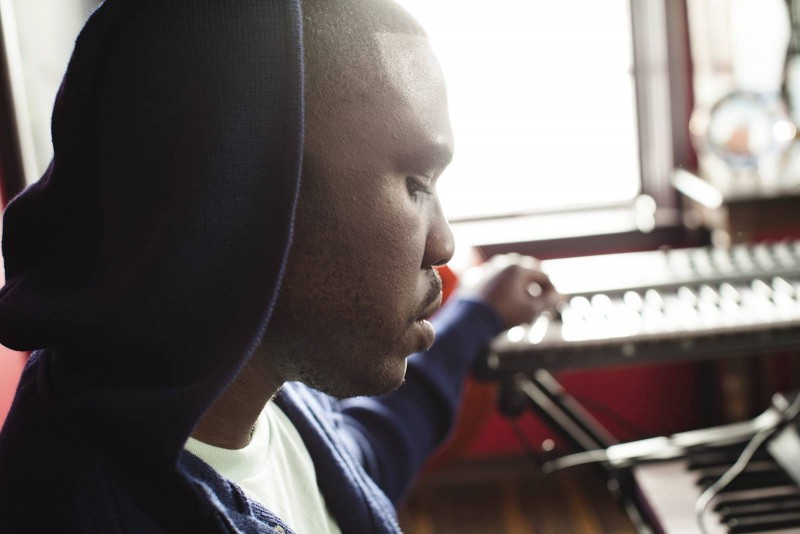
It’s funny that you said it was about making time, because I don’t understand how you made time to play all the instruments on the album as well as you did.
It started with the intent to just start something and get out of my comfort zone. That was the whole idea. What could I do expose myself as much as possible to make sure people walk away with a feeling from this music? That required me making the time: less gigs and less running around. Before a single note came to me, I had to make the sacrifice to make the time so that it comes. When it came, I was able to run down to the studio and get to work instead of putting it on the back burner and just hoping for the best.
The people were the motivation. It was blind faith to a certain extent. I didn’t have a single thing written. I said, “I’m going to make the time. This is my way of thanking the people for showing love. I want to continue to build and make the time so that it happens.” Fortunately it did, because it was really a risk.
How long was the whole process?
It took me about six months. It took days of nothing happening and it took days of distractions. Those days where I put time aside and nothing came were the toughest days to keep reminding myself to stick with it and stick with giving my own being time to just let it come. So it was six months of time, but probably only one or two months of actually recording if you put it all together. It was really just making the time for the ideas to come and let my mind work through them before I even put a single thing down. That was the biggest adjustment for me. I’ve probably made more time for this than anything else in my career.
It’s got to be difficult when you’ve got so many jobs: bassist, producer, MD…
Yeah. I don’t take that for granted, either. I feel very fortunate that that has been my situation. It’s a blessing. But in it, it’s also helped me fulfill some other goals I’ve always wanted to do, especially with helping to promote other musicians and put them in a position where they can succeed. You know, there’s only so many gigs out here for all of us. I think it’s important for us to take ownership and help create opportunities for others as well. That’s what’s going to keep the music alive, if a larger portion of people can take ownership in the scene. Even if that’s having people sub out different gigs or putting other people on recording sessions instead of me bending over backwards to try to do everything. It’s been a blessing just watching other people shine, and deservedly so. They just needed an opportunity just like I needed an opportunity. I think when people’s motives are pure, good things come. It’s an interesting time.
Do you feel like that sort of altruism is coming about more and more in musicians?
I think the reality is hitting a lot of musicians that we have each other. We really do. In the grand scheme of things, someone can get as much shine as they want to get and oftentimes they do get it. But for the scene as a whole, we need to make those sacrifices where we’re working to create music that we believe is relevant to us – which in turn should be relevant to our time – and also make the sacrifices to make the live music thing happening where we all feel ownership in the scene and do what we can to keep it pushing forward. I think that reality is hitting more people.
The cool thing is that as far as a lot of the musicians that I’ve met in my career, people just get along. That helps facilitate a kind of unity. It doesn’t matter what kind of music you do, there’s a lot of musicians into a whole bunch of different things, checking out each other’s music and not being ashamed to call somebody who might have just done jazz and saying, “I want to work with you on something I’m DJing.” You know what I mean? there’s a crossbreeding of different minds coming together now and I think it’s all reflected on the scene and why we get a real authentic sound out of a lot of musicians now.
I really love the whole album, but one song that really stood out to me was “Heart of a Dreamer”. Was that about anything in particular? The sounds of pen on paper as the intro and outro are really thought provoking.
With so many songs, it doesn’t matter the emotion that I might feel when I’m writing something. I try to leave space so that anybody can get what they want to get from it. Sometimes words or overly describing things – even in the names of songs – can force people to think a certain way or make them believe that you meant something specific for people to come away with. I like the mystery of letting people take it and run with it. “Heart of a Dreamer” was one of those things where I actually had been writing and the mic was running and recording. When I went back I heard [the writing sounds] and thought it sounded cool. I [decided to] just start building.
It was a certain feeling at first, though. The name of that song originally was “Heart of a Woman”, believe it or not. As soon as you hear that, it makes you think a certain way. I was like, “Let me keep the feeling and the openness and the mystery so that whoever listens to it can go with it.” So I changed it to “Heart of a Dreamer” because at it’s core that’s what I am. That song is highly emotional for me, but I just took it and ran with it. I kept layering things and let it try to speak to me a certain type of way.
That’s incredible. That almost seems like part of your improvisation background. Where some people might have just tossed the writing sounds, you took it and ran with it.
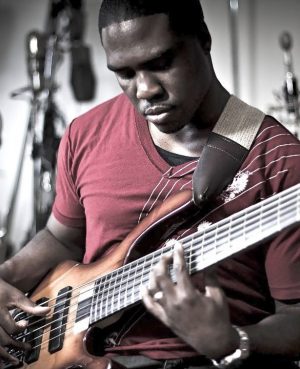 It’s weird… I tend to not overly think emotions. I just go with it, and it might not necessarily be attached to a specific experience that I might have had. It might be something I’m tapping into that might be my perception of someone else’s experiences or someone else’s love story or someone else’s tragedy. It’s not necessarily mine, but I might tap into it at a certain moment and a song will come out. I get responses that people say it made them feel this type of way or that type of way.
It’s weird… I tend to not overly think emotions. I just go with it, and it might not necessarily be attached to a specific experience that I might have had. It might be something I’m tapping into that might be my perception of someone else’s experiences or someone else’s love story or someone else’s tragedy. It’s not necessarily mine, but I might tap into it at a certain moment and a song will come out. I get responses that people say it made them feel this type of way or that type of way.
It’s eye-opening for me, because it [reminds me] that it’s really not about me and what my original intent was. It’s about whether it’s helping people, making them love better, forgive better… If it’s doing all that, then cool. How do I keep building on that? The intent with this record was to do that by taking away everything that overly describes and let people dream and run with it however they want to. Actually, as a player I’ve been trying to do the same thing. No matter what the feeling, try to be really lyrical with it and try to think outside of the instrument to where I’m not thinking about the limitations or even what the voice of that instrument is. I just try to let it speak and hopefully it will come across, but it’s all one and the same in terms of the intent.
What kind of gear do you use?
For this album I almost exclusively used my Callowhill bass. It’s the same six-string Callowhill bass, made by Tim Cloonan, that I played “Message of Hope” on from Live Today. I didn’t use any guitars on this record. I wanted it to all sing from the bass. I believe on one or two songs I used my Fender Jazz Bass V that Tim Cloonan took and made a little more comfortable for me. He put some Nordstrand pickups in that one. Believe it or not, I also used a Squier Jaguar. [laughs] It was like $199. I was randomly in a Guitar Center jamming with a friend of mine named Hod David, who is a producer with Maxwell. I picked up that bass and we loved it. We walked out of there with it. That bass almost fell apart like three times in that month. [laughs] But I liked the sound of it and the way it recorded, so I went with it.
As far as amplification, I used TC Electronic RS410’s for the whole record, and then I used the RH750 head. I used the Blacksmith head a little bit, too, which is similar but has different gain stages. Every song that had electric bass had the TC rig in it. I don’t really get crazy with amplification in terms of over-EQing or anything like that. When I find something I like to stick with it. Those amps are cool and you can save your settings plus they’re so small I can travel with it. It’s made my live sound so consistent.
And that was another part of the goal. I wanted to make sure people were taking away my normal, natural, creative way instead of going into a bigger studio and using gear I don’t always use. I wanted people to hear the experience with me; that intimate and building-on-something in a really raw, organic way. Having a simple setup allows me to do that where I can record in my hotel or take it to my studio downstairs or in my bedroom. That was really the process throughout this whole record. It could happen at any moment.
What else is coming up for you?
It’s a cool time and I’m really excited. I’m gearing up. People have been showing love for The Second already and I’m ready to get out and tour some of this music live. I’ve already started introducing the concept live that I did for the studio recording. I’ll be going on the road with it being just bass and drums. I’ll play bass and switch over to keyboard and do some triggers, that type of thing. I’ll sing a little bit, too. It’s been a blast. I’m gonna mix it up and do a lot more of my live shows over the next year or so. Between that and touring with Maxwell for the rest of this year, it’s keeping me pretty busy. I’ll also be working on some film projects that I look forward to revealing soon.
Anything else you want to add?
I try to make sure as an artist that people can feel this message without me having to say it: pursue your dreams and what you believe makes you tick. Believe in it. Go ahead and spend a massive amount of time developing your craft and taking risks. Be fearless in attaining information. Be willing to be that student. Take all that stuff and your experiences – whether you’re a musician or an artist – and don’t be afraid to let that become your voice. Put it out there. It’s an interesting time, and in this era we live in honesty is needed. People gravitate to that. This music is not just for me. It’s to make sure this scene keeps living and encourage other people to do the same and be willing to tell their story and build up a body of work unapologetically. I encourage other artists to keep doing it and I’ll support you all just like you all support me. Let’s make each other win.

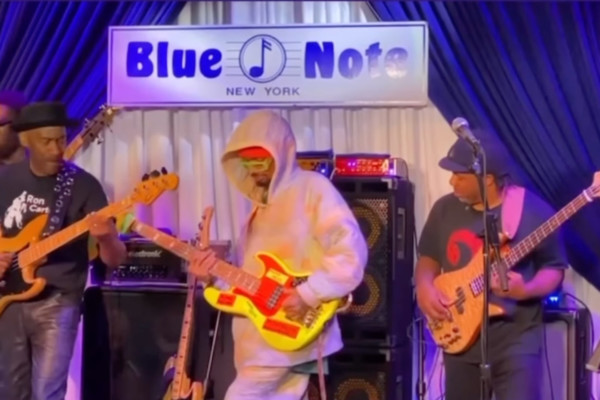
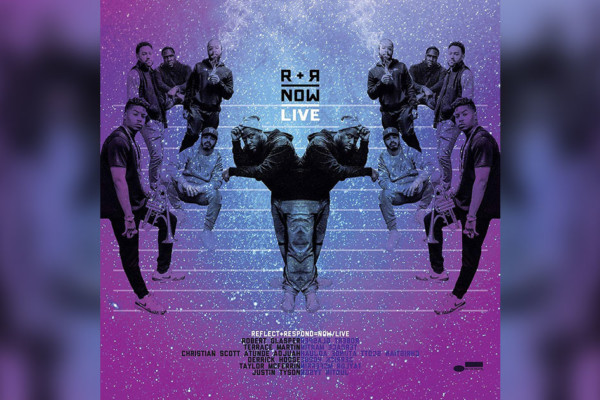
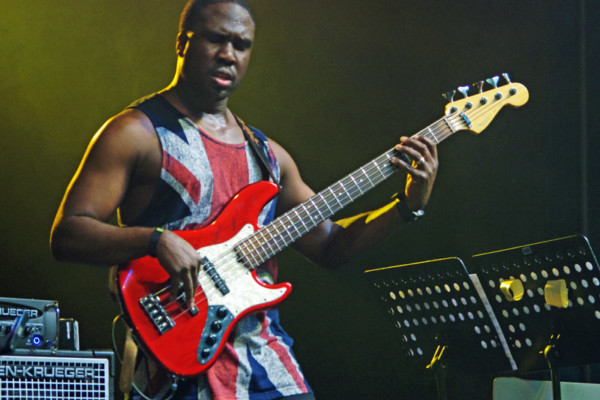
Keep on movin’ Bass Jedi.